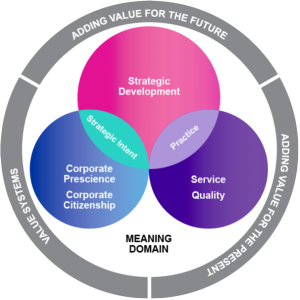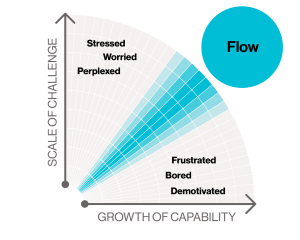Judgement in Uncertainty
In a 2020 article published in the Harvard Business Review, The Elements of Good Judgement, Sir Andrew Likierman explored the concept of Judgement, guiding our understanding of this concept and showing us how to acquire and recognise it.
He quotes Noel Tichy and Warren Bennis (the authors of Judgement: How Winning Leaders Make Great Calls) who refer to Judgement as the ability to combine personal qualities with relevant knowledge and experience to form opinions and make decisions. Likierman maintains it is what enables a sound choice in the absence of clear-cut, relevant data or of an obvious path. He goes on to say that “some experts define it as an acquired instinct or “gut feeling” that somehow combines deep experience with analytic skills at an unconscious level to produce an insight or recognize a pattern that others overlook.”
In the HBR article Likierman emphasises thinking critically as well as the importance of experience, emotional intelligence, and incremental cognitive competence. Furthermore, he discusses how to develop good judgement in managers and leaders. Likierman’s appraisal of judgement is both astute and pertinent to our times – and it expertly articulates many of the facets that comprise this key ability. I would like to expand on his description by adding yet another, vital, piece to the puzzle.
EDAC’s approach to Judgement
In our experience at EDAC, every individual working in an organisation must exercise judgement and find their own path within the boundaries of their work. Unlike past experience or previously acquired knowledge, judgement is the decision-making capability that comes into play when we do not, and cannot, know what to do (Stamp, 1992). Because judgement is what we rely on in unfamiliar, volatile and ambiguous situations, the exercise of judgement is fraught with uncertainty. There is work in organisations that requires judgement around Quality, Service, Best Practices, the optimisation of resources and efficiencies. These roles are tasked with adding value to the organisation for the present. However, there is also other work that is responsible for ensuring the longer-term sustainability of an organisation, where the work is to create value for the future and to create purpose and direction. The uncertainty levels amongst these types of work are different, and individuals occupying the various roles are faced with an array of judgements, ranging from dealing with “tame problems” to having to tackle “wicked problems”.

When life is moving smoothly, and problems are “tame” there is less uncertainty. A “tame problem” is one that may be complicated but has likely occurred before – a combination of experience, knowledge and judgement can be applied to resolve it. “Wicked problems”, on the other hand, are the ill-defined, ill-structured, real-life decisions that have incomplete, contradictory and changing requirements. In these situations, experience cannot inform decisions, and knowledge is incomplete. Therefore, it is when we face wicked problems – when we do not, and cannot, know what to do – that we are forced to rely most upon our judgement.
In the last thirty years, the growth in interest and research into the processes of decision-making has led to a different view in academic, applied and popular thinking. In short: a new value has been placed on ‘tacit knowledge’, ‘insight’, ‘intuition’, and access to non-verbalised material. It is now increasingly widely accepted – even in the most ‘rational’ literature – that people make decisions as a consequence of an interplay between that which is articulated and that which is not, and that they make decisions without being able to report on the thought process that led them to their conclusion (Salk, 1983, and Agor, 1984, cited in Stamp, 1992).
Judgement is thus that part of ourselves that we have to call on when Skills, Knowledge and Experience no longer generate the complete answer. It is what we use to pattern and order complexity and uncertainty, to enable us to navigate it and continue to make sound decisions, even when we do not, and cannot, know the answer.

Growth in Judgement
We know that Judgement in this sense grows over time. Put simply, people’s ability to cope with uncertainty is likely to be greater when they are older than when they were younger. What is more, one’s capability to exercise judgement will continue to grow, at different, yet predictable rates. Our research indicates that some people may always be comfortable applying judgement in conditions that are fairly certain and operational, whereas others may grow to levels where they are comfortable applying judgement in uncertain, abstract and ambiguous conditions.
Judgement and Flow
At EDAC we use the Modified Career Path Appreciation (MCPA) and the MCPA-SCAN to evaluate an individual’s capability, or their “decision-making process in the face of uncertainty” in their work. The process provides an indication of an individual’s current capability, as well as potential growth in capability, otherwise known as an individual’s “mode”.
An experience of Flow, a term coined by Csikszentmihalyi, is most likely to occur when people’s capability corresponds to the degree of uncertainty, or complexity, they are faced with in their work. Those experiencing flow typically become aware that they are losing themselves in their work in the sense that they are no longer aware of the passage of time, whilst busy with (and optimally engaged by) the task at hand. In this ideal situation, the individual feels stimulated, is optimistic and delivers to the best of their ability. The company, or the employer, in turn benefits from an engaged, productive and thriving workforce comprised of people who are using judgement to create well-being, profit and a sustainable future.

Ensuring that individuals are given the opportunity to exercise their judgement optimally in a role and environment that enables flow is unquestionably a state to which every organisation should aspire.
At EDAC, we help organizations harness judgement to navigate uncertainty and foster sustainable growth. Contact us today to learn how we can support your team’s decision-making and create lasting value.
References
Agor, W.H., 1984, Intuitive Management: Integrating Left and Right Brain Management Skills, Prentice Hall Inc.
Likierman, A., 2020, The Elements of Good Judgement, Harvard Business Review
Salk, J., 1983, Anatomy of Reality. Merging of Intuition and Reason, Columbia University Press, New York.
Stamp G, 1992 Day of Judgement, or In Praise of Leprechauns, an occasional paper.
Latest Blogs
- The Role of Psychometric Assessments in Employee Selection and Development: A Scientific Approach
- An Introduction to Requisite Organisation (RO) and Levels of Work (LoW)
- Judgement in Uncertainty
- Organisational Design: Myths and Best Practice
- Creating leadership signature: Importance of supporting a transition
